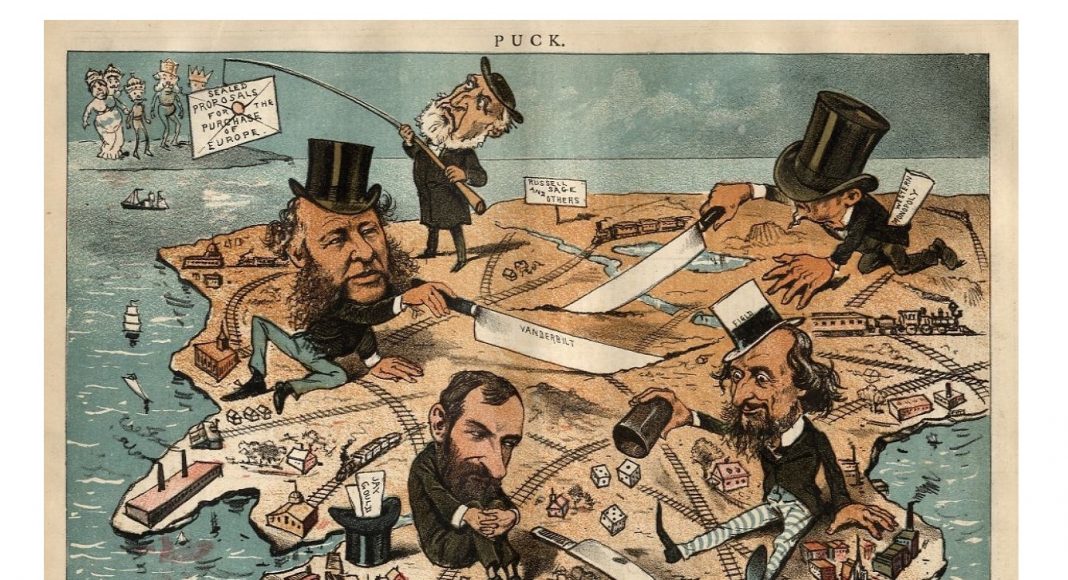Many see the US as a land where free markets and antitrust enforcement have historically kept monopolies under control. But is that really the case? Watch a conversation between Stanford University professor Stephen Haber, Columbia University professor Richard R. John, and Luigi Zingales.
The Stigler Center’s Monopolies and Politics Workshop Webinar Series explores the interconnection between monopolies and politics, and the historical evidence of monopolies capturing national governments and how these processes may have impacted governance and democracy in different countries.
Many see the US as a relative exception to these trends: a land where free markets and antitrust enforcement have historically kept monopolies under control. But is that really the case?
Watch the May 28 conversation between Stanford University professor Stephen Haber and Columbia University professor Richard R. John on whether America was exceptional, and—if so—whether it is still exceptional today. The conversation is moderated by Chicago Booth professor Luigi Zingales.
The Speakers
Stephen Haber is the A.A. and Jeanne Welch Milligan Professor in the School of Humanities and Sciences and Peter and Helen Bing Senior Fellow of the Hoover Institution at Stanford University. He is also a Professor of Political Science, History, and Economics (by courtesy), a Senior Fellow of the Stanford Institute for Economic Policy Research, and a Senior Fellow of the Stanford Center for International Development. Haber’s research spans a number of academic disciplines, including comparative politics, financial economics, and economic history. He has authored, co-authored, or edited ten books, and his papers have been published in numerous journals. Haber’s most recent book, Fragile by Design: The Political Origins of Banking Crises and Scarce Credit (coauthored with Charles Calomiris) was published by Princeton University Press in 2014. His current research focuses on two areas: the impact of geography on the long-run evolution of economic and political institutions; and the political conditions under which societies sustain intellectual property systems that promote innovation.
Richard R. John is a historian who specializes in the history of business, technology, communications, and American political development. He teaches and advises graduate students in Columbia’s Ph.D. program in communications, and is a member of the core faculty of the Columbia history department, where he teaches courses on the history of capitalism and the history of communications. His publications include many essays, eight edited books, and two monographs: Spreading the News: The American Postal System from Franklin to Morse (1995) and Network Nation: Inventing American Telecommunications (2010). John has been a fellow at the Newberry Library in Chicago and the Smithsonian Institution’s Woodrow Wilson Center, and has served as a visiting professor at the École des Hautes Études en Sciences Sociales (EHESS). Among the institutions that have sponsored his research are the College of William and Mary, the American Antiquarian Society, and the National Endowment of the Humanities, which awarded him a faculty fellowship in 2008.
Luigi Zingales (moderator) is the Robert C. McCormack Distinguished Service Professor of Entrepreneurship and Finance and the Charles M. Harper Faculty Fellow and Director of the Stigler Center at the University of Chicago Booth School of Business. His research interests span from corporate governance to financial development, from political economy to the economic effects of culture. He has published extensively in the major economics and financial journals. He also wrote two best-selling books on capitalism—Saving Capitalism from the Capitalists: Unleashing the Power of Financial Markets to Create Wealth and Spread Opportunity (with Raghuram Rajan) and A Capitalism for the People: Recapturing the Lost Genius of American Prosperity. He recently launched the Capitalisn’t podcast with Katherine Waldock from Georgetown University. @zingales






